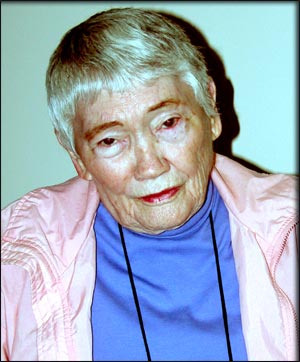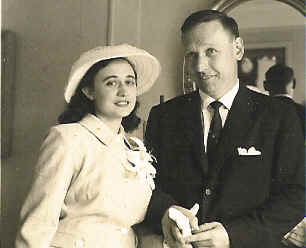Veterans
World War
II Vet Recalls Her Service in Women's Army Corps

"Having Veterans Day is important because you get a lot
of memories, but you never win anything fighting a war,"
said retired Army Sgt. 1st Class Ida Simpson, who lives at the
Armed Forces Retirement Home in Washington. Photo by Rudi
Williams
Veterans
Day is special for Ida E. Simpson, because it gives her a chance
to reflect on serving her country during World War II, which was
something she thought a woman in those days wouldn't be able to
do. The 82-year-old veteran spoke of her
service in an interview at the Armed Forces Retirement Home
here, where she resides.
Simpson,
who joined the Women's Army
Corps in January 1944, said she's proud of the fact that she
was one of the "early ones."
When Simpson joined the Women's Army Corps, she said, she
went into the Army Air Corps because "they were needing
everybody they could round up and we, the women, wanted to do
something to help."
She said she enlisted as soon as she finished Louisiana State
Normal College, which is now Northwestern State University. She
wanted to major in journalism, but was told there wasn't any
future in journalism for a woman. So she majored in health and
physical education.
"In the war, I was a switchboard operator with the
3341st Signal Battalion," she noted. "When I joined
the Army I told them I wanted to go overseas, and they sent me
to France after the June 6, 1944, D-Day invasion."
Her outfit sailed out of New York on Aug. 15, 1944, on a
troop transport ship that had brought German prisoners from
England to the United States. It took 15 days to cross the ocean
because of bad weather and German U-boats, according to Simpson.
After more training in England, Simpson said, "They
wouldn't tell us where we were going, but one night, they put us
on a small boat and took us across the English Channel to
Normandy Beach, France. You could see all the boats all torn up
from the D-Day Invasion. It was really awful!
"They asked us if we wanted to look inside the German
pill boxes (concrete machine-gun fortifications) to see the
remains of the German soldiers and their weapons," she
said. "I wasn't interested in that, but some of our people
did it."
The women soldiers stayed on the beach about 10 days until
all the landmines were cleared. "Then they put us in those
big trucks and took us all day long and into the night to get to
Paris -- the city of lights. But the only light we had were the
moon and stars," Simpson said with a good-natured chuckle.
While in England, the women were taught how to operate field
switchboards. "When we got to Paris, they assigned us to
the 3341st Signal Battalion," she said. "We sent
messages back and forth across the English Channel and all over
the European Theater."
Simpson said the women put through hundreds of telephone
calls every day. During each call they had to say, "Will
you guard your conversation, please. The enemy may be
listening."
"My roommates and I would wake each other at night
saying that in our sleep," she said. "We would laugh
about it, but it wasn't really funny."
The women stayed in Paris until after Victory in Europe Day,
or VE Day.
"Before we left France, the French people wanted to show
their appreciation for women who served there during the
war," Simpson noted. "So they had a big parade for us
that went all the way from the Arc de Triomphe to the end of the
Champs-Elysees."
The former noncommissioned officer said women soldiers lived
in a beautiful chateau in Compiegne, France, that had a
fireplace in every room. "Our troops lived up on the hill
in tents," she said. "I felt sorry for them, but not
sorry enough to give up my fireplace."
When the personnel processing center was moved to Le Havre,
France, Simpson said she could have returned to the United
States, but she stayed until she felt her company could get
along with fewer people.
Returning home in March 1946, she was discharged from the
Army, and tried civilian life for a while. "There still
wasn't much for a woman to do to earn any money," Simpson
noted. "So I re-enlisted to participate in the Berlin
Airlift, but wasn't able to do so because I caught pneumonia
during processing at Fort Dix, N.J."
Simpson ended up working at a separation center at Camp
Kilmer, N.J. That's where she finally got a chance to become a
journalist. "My commanding officer found out about an
opening on the Kilmer Eagle newspaper and suggested that I try
for the job," she said. "They took me in and taught me
how to write, and I became a journalist, which was what I'd
always wanted to do."
In the interview, Simpson spoke on the significance of
Veterans Day. "Having Veterans Day is important because you
get a lot of memories, but you never win anything fighting a
war," she said, "especially the people who have the
burden of fighting the war."
Dedicated to our fallen heroes
and all past and present servicemembers, who unselfishly have
given their lives and continue to put themselves in Harms Way.

Ralph W. Ashland, with his
war bride, Jacqueline, bringing nations together.
This site is
dedicated to Ralph Waldo Ashland, 01.12.22 - 15.09.84, a
WWII Veteran, who landed on the beaches of Normandy on D Day,
June 6th, 1944 and stayed in the European Theater until his
death, dedicating his life to the preservation of freedom and
democracy. Whether by his role in the de-nazification of
Germany or helping to rebuild Europe, his legacy lives on and is
not forgotten.
|